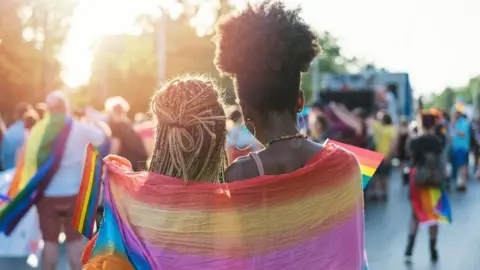Barbados scraps laws banning same-sex acts
 Getty Images
Getty ImagesThe High Court in Barbados has struck out their laws that criminalised gay sex.
The previous laws from 1992, while rarely invoked, demanded a life sentence for those found guilty of having consensual same-sex relations.The High Court in Barbados has struck out their laws that criminalised gay sex.
The previous laws, while rarely invoked, demanded a life sentence for those found guilty of having consensual same-sex relations.
Barbados is the third Caribbean nation to make similar reforms this year.
Activists and members of the LGBTQ+ community who have fought for the change welcomed this week's ruling, saying it promoted privacy and freedom.
Local advocacy group Eastern Caribbean Alliance for Diversity and Equality (Ecade) said on Twitter the ruling "consolidates the rights of all Barbadians to privacy and freedom of expression, and impacts LGBTQ+ people across the eastern Caribbean".
Two LGBTQ+ advocates in Barbados filed the case, in partnership with local organisations, including Ecade.
In a statement, Barbados attorney general Dale Marshall said Justice Michelle Weekes issued the ruling on Monday, concluding that two sections of the 1992 Sexual Offences Act were unconstitutional.
"In short, [the ruling means] we can no longer prosecute persons under these two sections," he said, adding that charges for offences relating to consensual gay sex could no longer be maintained.
Written reasons for the decision in the case were not expected for a few weeks, Mr Marshall said.
"This is a huge win for the community and for Barbados. This has been years of work and that work still continues," Rene Holder-McLean Ramirez, who helped bring forward the claim, said.
Earlier this year, courts in the Caribbean have found similar laws to be unconstitutional in Antigua and St. Kitts and Nevis.
The previous laws in Barbados were inherited from the UK when the Caribbean island was a British colony. Barbados gained its independence in 1966.
"We are very pleased with the result of this case, which is a result of years of advocacy efforts by the community organizations as well as the litigants," Michael Rapley, a member of the NGO Equals, told Reuters.
"This is a step in the right direction for the protection of LGBTQ+ people in Barbados as we continue to ensure stigma-free access to services and positive inclusion in society."
This "historic" ruling was described as "a significant step towards protecting the human rights and dignity of LBGT people in Barbados," according to Luisa Cabal, of the joint United Nations programme on HIV/AIDS.
She added that it "will also strengthen the country's HIV response by helping to reduce stigma and discrimination faced by LGBT people and increasing the uptake of HIV testing, treatment and prevention services".
At least 66 countries in the world still criminalise gay sex, according to Human Rights Watch.
Clarification January 11: This article was edited to clarify that the laws, which were recently repealed, were not from the country's colonial past but were introduced in 1992.
